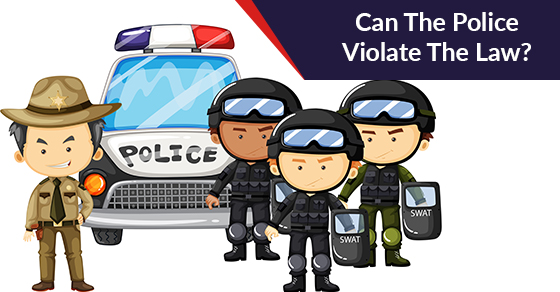CAN THE POLICE VIOLATE THE LAW IF THEY ARE HONEST ABOUT IT?

The simple answer is, thankfully, No.
A senior police investigator in Waterloo recently thought he had figured out a clever way to do an end run around the Charter of Rights, and he almost got away with it, until he was stopped by the Ontario Court of Appeal.
The police were investigating the theft of a large quantity of firearms and ammunition. They arrested the man who sold the guns; he told police he had set up a meeting with the purchaser, Frank Strauss, at an intersection out in the country. At the meeting point, Strauss paid in cash, and left with the guns and ammunition.
The police were determined to track down the guns, and assumed they would be located somewhere in the area where the transaction had taken place. But they had no further information about which property the guns were being stored at. They did connect Strauss to one property, a farm nearby, because his car was spotted there once during an unrelated investigation.
Police went to the farm, unannounced and without a search warrant. They approached the barn, picked the lock and went inside. Their hunch paid off, and they found over a dozen guns, ammunition, and cash.
A few weeks later, Strauss boasted to a friend that the police had missed the rest of the stash, which was hidden behind a fake wall in the barn. The “friend” went to the police and told them about this (to get out of trouble for his own misdeeds). This time, police got a warrant and seized the rest of the cache of drugs, ammo and cash. In seeking the warrant, the police were even candid with the justice of the peace about the illegal search, admitting that they had no grounds and no right to search the farm the first time.
At trial, the judge found that when the police illegally entered the farm and picked the lock without a warrant, they had violated Strauss’s rights. The evidence seized in that illegal search was excluded from evidence. But the judge said that the second search, where the police obtained a warrant, was a valid one. One reason the second search was upheld was that the police had been honest about their conduct and had not tried to hide it! As a result, Strauss was convicted and sentenced to 11 years in jail.
From the standpoint of the police, they “lost the battle but won the war”: by engaging in an illegal search, they forfeited the court battle over the evidence from the first seizure, but they got the guns off the street, and still put Strauss in jail for many years due to the second seizure. To the police, this seemed like a pretty good trade-off.
Not so fast, said the Court of Appeal.
This is a classic case of the police playing fast and loose with the Charter of Rights, a case of the “end justifies the means”. But the Charter of Rights is not a bargaining chip, and fundamental freedoms are not a poker game that the police can bluff their way through.
Even though the police had a warrant for the second search, it formed part of a “pattern of abuse” which the courts had to denounce. The evidence in the second search was part of a “series of investigative tactics”, involving “multiple, serious, and deliberate breaches of the appellant’s rights”.
The fact that the police were candid about the violations when they applied for the search warrant did not diminish the seriousness of the breaches, and to permit the police to do an end run around the Charter in this fashion would “give the police a licence to engage in misconduct and render the Charter’s protection meaningless”.
This was not about punishing the police, said the Court. It was about “preservation of public confidence in the rule of law”.
As a result of the flagrant, systematic violations by the police in this case, the Court of Appeal overturned Strauss’s conviction, and let him walk free. That was a brave and principled decision by the Court, and a re-affirmation of the supreme importance of the Charter of Rights and the fundamental freedoms it protects.
“Clever” cops, take note. And get a warrant the first time around.

